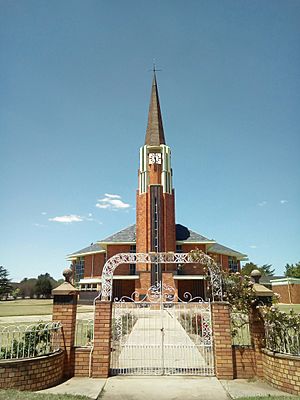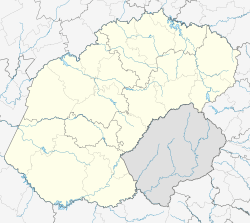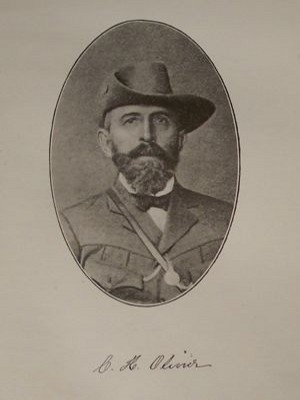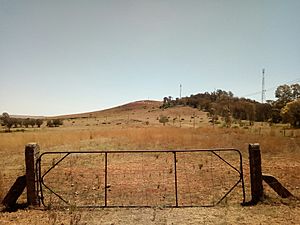Petrus Steyn facts for kids
Quick facts for kids
Petrus Steyn
|
|
|---|---|
| Mamafubedu | |

Petrus Steyn Church
|
|
| Country | South Africa |
| Province | Free State |
| District | Thabo Mofutsanyane |
| Municipality | Nketoana |
| Area | |
| • Total | 11.0 km2 (4.2 sq mi) |
| Elevation | 1,700 m (5,600 ft) |
| Population
(2011)
|
|
| • Total | 12,893 |
| • Density | 1,172/km2 (3,036/sq mi) |
| Racial makeup (2011) | |
| • Black | 87.7% |
| • Coloured | 0.3% |
| • Indian/Asian | 1.5% |
| • White | 10.4% |
| • Other | 0.1% |
| First languages (2011) | |
| • Sotho | 75.2% |
| • Zulu | 3.4% |
| • Afrikaans | 14.6% |
| • Sign language | 2.0% |
| • Other | 4.8% |
| Time zone | UTC+2 (SAST) |
| Postal code (street) |
9640
|
| PO box |
9640
|
| Area code | 058 |
Petrus Steyn is a small farming town in the Free State province of South Africa. It is located between the towns of Tweeling and Kroonstad. This area is known for its farms, which grow crops like wheat, maize, and sunflowers. Farmers also raise cattle and sheep here.
Petrus Steyn is the highest town above sea level in the Free State. Many potatoes are grown here and sent all over the world. In 2011, about 12,800 people lived in Petrus Steyn. In 2012, the town's name was officially changed to Mamafubedu.
Sometimes, residents have concerns about local services, like water supply. In 2019, there were protests about these issues.
Contents
History of Petrus Steyn
The town of Petrus Steyn is named after a farmer, Mr. Petrus Paulus Steyn. He was born in 1842 and passed away in 1897. His widow sold a farm called Sterkfontein. She agreed to sell it only if the new town built there was named after her husband.
The farm was sold on October 11, 1912. This date is considered the official start of the town of Petrus Steyn. The Renoster River begins right next to the old Petrus Steyn family graveyard. This area is now being turned into a special park for heritage and the community.
Exploring Petrus Steyn's Landmarks
Petrus Steyn has several important monuments and historical places. These sites help us remember the town's past and important events in South African history.
Afrikaans Language Monument
On August 14, 1975, a special monument was built to celebrate 100 years of the Afrikaans language. Visitors stacked stones to create this monument.
Ox Wagon Wheel Monument
In 1938, a monument was put up to remember the Great Trek. This was a big journey made by pioneers in ox wagons. At this monument, you can see actual tracks made by ox wagons. There are also footprints from a famous pioneer leader, Sarel Cilliers. Both the Afrikaans Language Monument and the Ox Wagon Wheel Monument are in the town's main square, called Dirkie Uys Square.
Hooggelegen Farm Monuments
On a farm called Hooggelegen, you can find three more important monuments. These also remember the 1938 Great Trek celebrations. They also honor those who died during the Maritz rebellion in 1914.
Dutch Reformed Church Parsonage
The old sandstone house of the Dutch Reformed Church minister is a special place. From 1930 to 1933, a minister named Reverent Steyn lived here. He helped translate parts of the Bible from Dutch into Afrikaans. This house was made a national monument in 1988.
Heritage Sites in Petrus Steyn
These sites tell us more about the history and important people connected to Petrus Steyn.
Petrus Steyn Family Graveyard
The family graveyard of Petrus Steyn was started in 1898. It is located under an old oak tree, which is the oldest known tree in town. This graveyard is now part of the Rhino Heritage Park.
General Cornelis H. Olivier's Grave
General Cornelis Hermanus Olivier was a Boer General. He was one of the people who signed the Peace Treaty of Vereeniging. This treaty ended the Second Anglo-Boer War in 1902. He is buried in the old Petrus Steyn cemetery.
Elandskop Hill's History
Elandskop Hill is north of the town. During the Anglo-Boer War (1899–1902), it was a great spot for soldiers to watch from. It was especially important for the Boer forces. They used it as a heliograph station to send messages using flashes of sunlight. The hill is 1,637 meters above sea level.
Petrus Steyn Train Station
The train station in Petrus Steyn first opened in 1925. It connected the town to Heilbron by rail. Later, the train line was extended to Lindley. This old building, now 92 years old, has been declared a heritage site. Soon, it will become the Elandskop Museum.
Farming in Petrus Steyn
Petrus Steyn is a very important area for farming. It is one of the biggest producers of potatoes. These potatoes are even used to make popular snacks like Lays and Simba chips.
The Renoster River's Journey
The Renoster River starts right here in Petrus Steyn. It flows northwest, passing Heilbron. Then it goes into the Koppies Dam. The river continues past Koppies and under the N1 national road. It eventually joins the Vaal River near Renovaal.
Notable People from Petrus Steyn
- JC "Jaap" Steyn (1938–2021) was a journalist and professor. He taught about language and researched Afrikaans and Dutch.
- Dr Mothobi Lekota is a theologian and a preacher on Lesedi FM.
- Ennock Mlangeni is a talented visual artist.
- Twin Mosia is an award-winning museum curator.
- Nkutu Jacob Miya is an IBFF Africa Champion in 2023 and a runner-up in 2024.
Images for kids











